How The Economist Is The Worst Propaganda
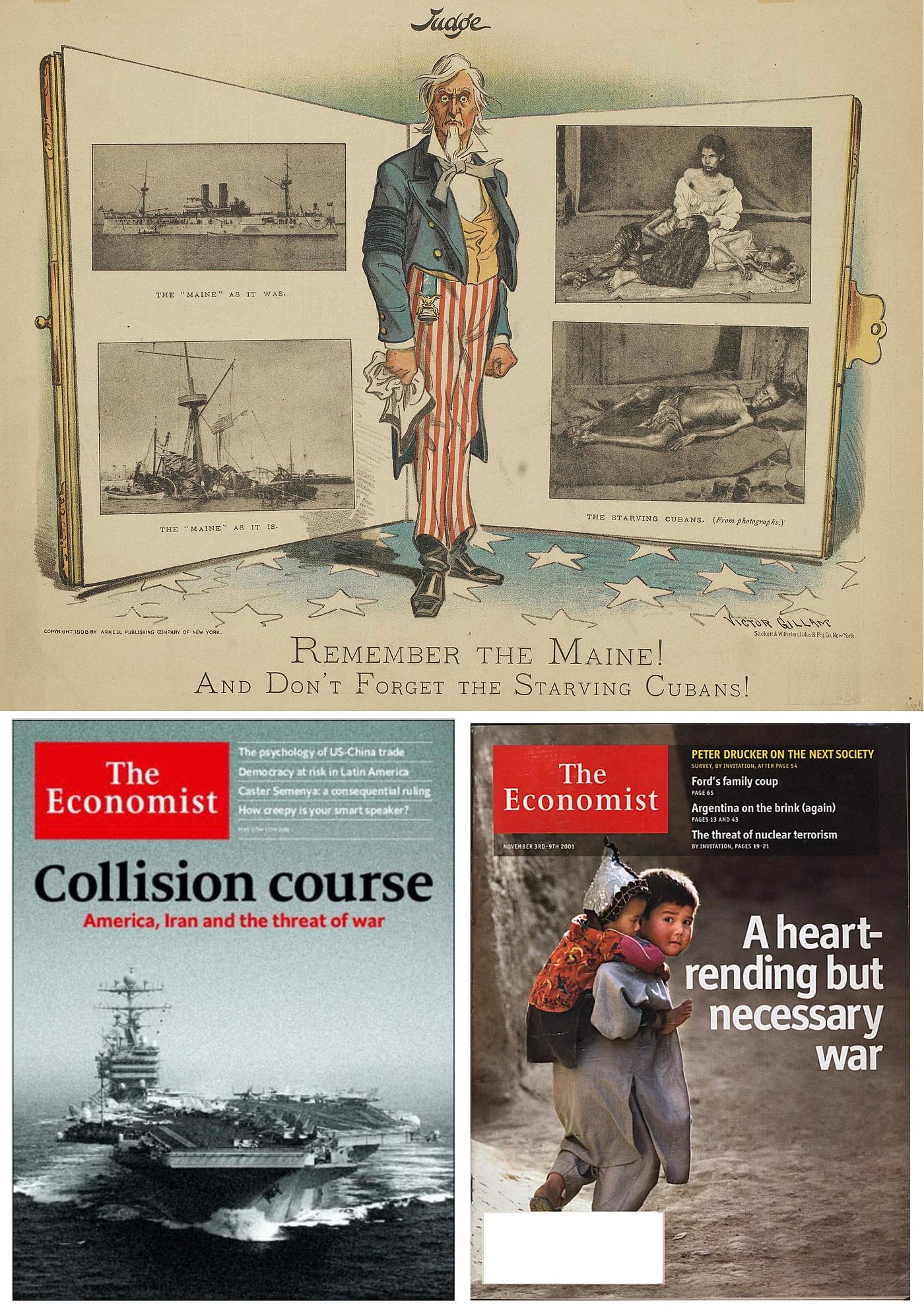
The West has privatized propaganda, like everything else. Economist covers, which I’ll cover here, would be laughed at if a government produced them. However, because the ruling class produces them instead of a ruling party, they hide in plain sight. And yet just look at them.
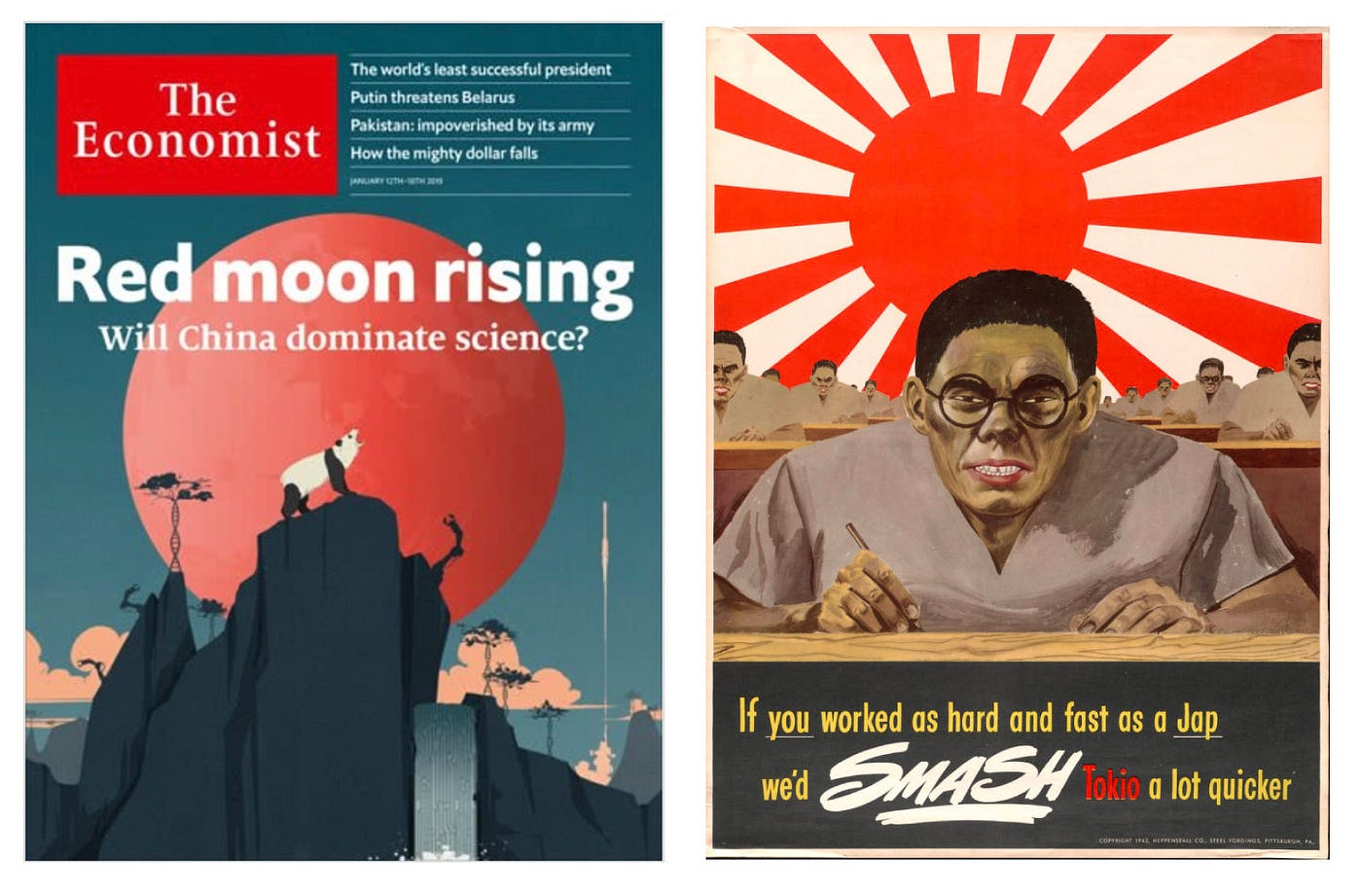
How are these different things? It’s not like The Economist even shies away from the dehumanization of entire peoples. Here’s their idea of light summer reading, portraying Arabs as ticking time bombs.
As Ghada AlMuhanna said. “Millions of Arabs wear shemaghs and iqals as part of their cultural identity. This cover fuels the narrative that anyone that wears these garments are ticking time bombs — that they’re terrorists waiting to explode.” From Russians to Chinese to Muslims, whoever the enemy du jour is are demonized en masse, a classic propaganda trope.
Even in terms of visual style, Economist covers openly look like propaganda, they overtly copy the same design tropes. This is supposedly ironic, but jokes on you. We generally define propaganda as coming from governments, but this misses the point of who actually rules the West now.
Liberal Democracy™ is simply the branding stamped on the most rank oligarchy. The truth is that elections are just public bribery festivals, the people are kept distracted by cultural circuses, and real economic power remains in the hands of a few elites. In this way, The Economist is simply privatized propaganda for a privatized state.
It is, in short, exactly what it looks like. As George Orwell said in 1984, “The Party told you to reject the evidence of your eyes and ears. It was their final, most essential command.” I invite you to just look at The Economist here. It sure looks and sounds like propaganda. Maybe it is what it is.
What Is Propaganda?
Before we get to examples, what is propaganda? Propaganda is often used as a catchword for ‘things I don’t like’. I certainly don’t like The Economist, but let’s try to define it more tightly here. The Google/Oxford definition is:
Information, especially of a biased or misleading nature, used to promote a political cause or point of view.
The latter is uncontroversially what The Economist does. As they wrote in 2018:
We were created 175 years ago to campaign for liberalism — not the leftish “progressivism” of American university campuses or the rightish “ultraliberalism” conjured up by the French commentariat, but a universal commitment to individual dignity, open markets, limited government and a faith in human progress brought about by debate and reform.
This is most decidedly a political cause and a point of view. A roundly elitist one too. As Alexander Zevin wrote in his history of the magazine, “James Wilson [was] adamant that his journal would aim for the ‘landed and monied’ and be ‘nothing but pure principles. The paper had what one of its later writers saw as an enlightening candour in addressing its readers: you opened it, he observed, to ‘hear the bourgeoisie talking to itself, and it could talk quite frankly’.” Lenin put it more directly when he called it “a journal which speaks for British millionaires.”
This isn’t an insult. It’s true. As Adam Tooze writes in his review of Zevin’s book, ‘If Pravda was once read in the west as the mouthpiece of “actually existing socialism,” Zevin examines the Economist as the house organ of “actually existing liberalism.”’
If you look at the bottom of every page on The Economist website, they state their bias quite openly if dickishly. The footer says:

According to The Economist, everyone else is stupid and we are smart and they are obstructing our progress. The quintessential liberal view. Who is ‘us’? Well, look at The Economist staff. The paper is literally guided by the ‘invisible hand’, running without bylines.
Describing the Editor-In-Chief, Zevin said, “In 176 years, just seventeen have filled the position: all but one a man, and for the last hundred years almost exclusively graduates of Oxford and Cambridge. At least one staffer has called the striking lack of diversity in this ‘common room’ an asset, making it easier to maintain a stable, collective voice.”
What is the voice of this paper? As Zevin relates, “How do you write like the Economist?’, a nervous new recruit, trying to compose his first leader for it, once asked. Simple, a senior editor replied. ‘Pretend you are God.” God is obviously a white man that went to Oxbridge. That’s the omniscient narrator.
The Economist has always represented the political views and biases of the white men that ruled the world most brutally. From the British Empire to the American Empire, it’s all been an undifferentiated White Empire to people like me. Their secular religion is liberalism and The Economist is their screed.
But you don’t have to take my word for it. If you read on you’ll just see.
Why Is Propaganda Bad?
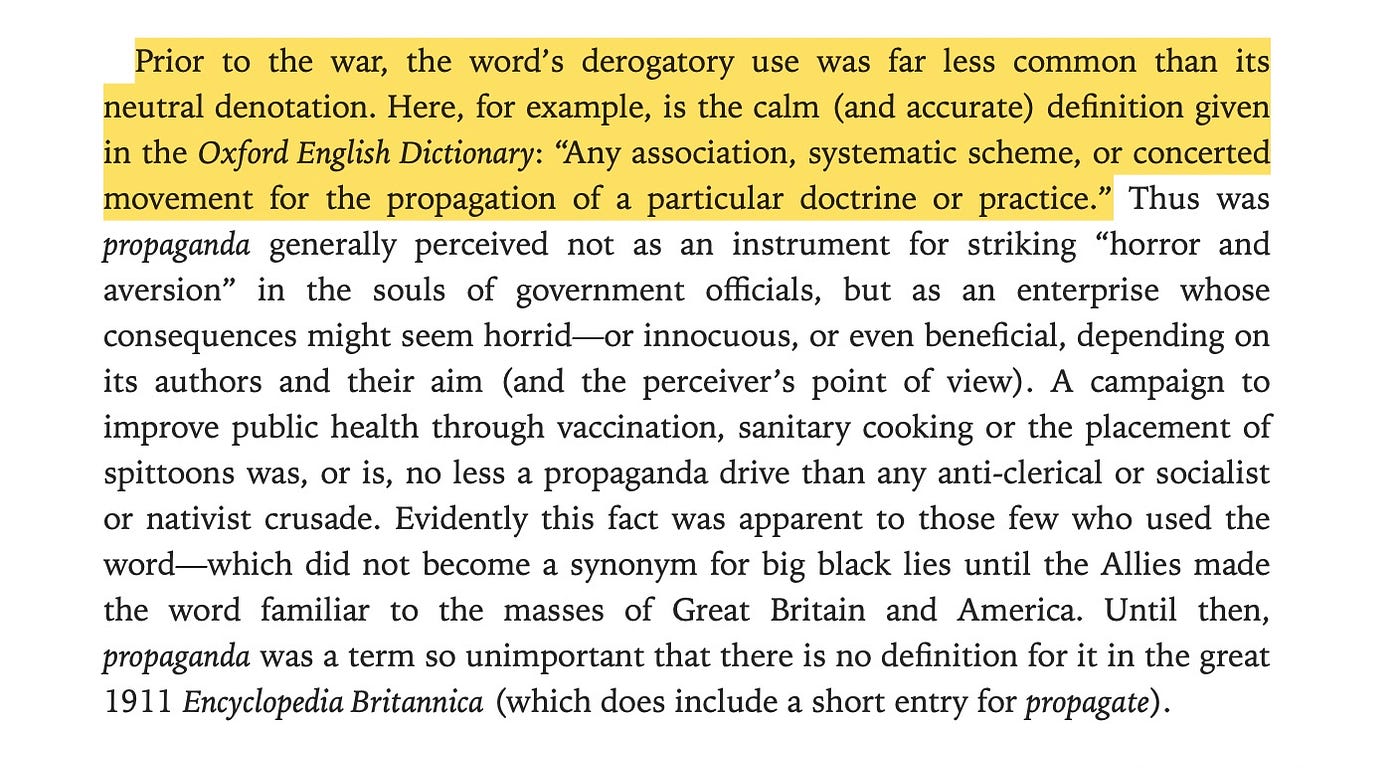
By a broader definition, propaganda isn’t necessarily bad at all. Quoting another version of the Oxford English Dictionary, Edward Bernays said, “Prior to the war, the word’s derogatory use was far less common than its neutral denotation. Here, for example, is the calm (and accurate) definition given in the Oxford English Dictionary: “Any association, systematic scheme, or concerted movement for the propagation of a particular doctrine or practice.”
What made propaganda bad (or at least dangerous) was its use in war. It became a weapon for quite actively killing people and rousing them to kill, and it was massively effective. Industrialized information production went hand in hand with industrialized tank and bomb production, it was all part of the modern capitalization of war.
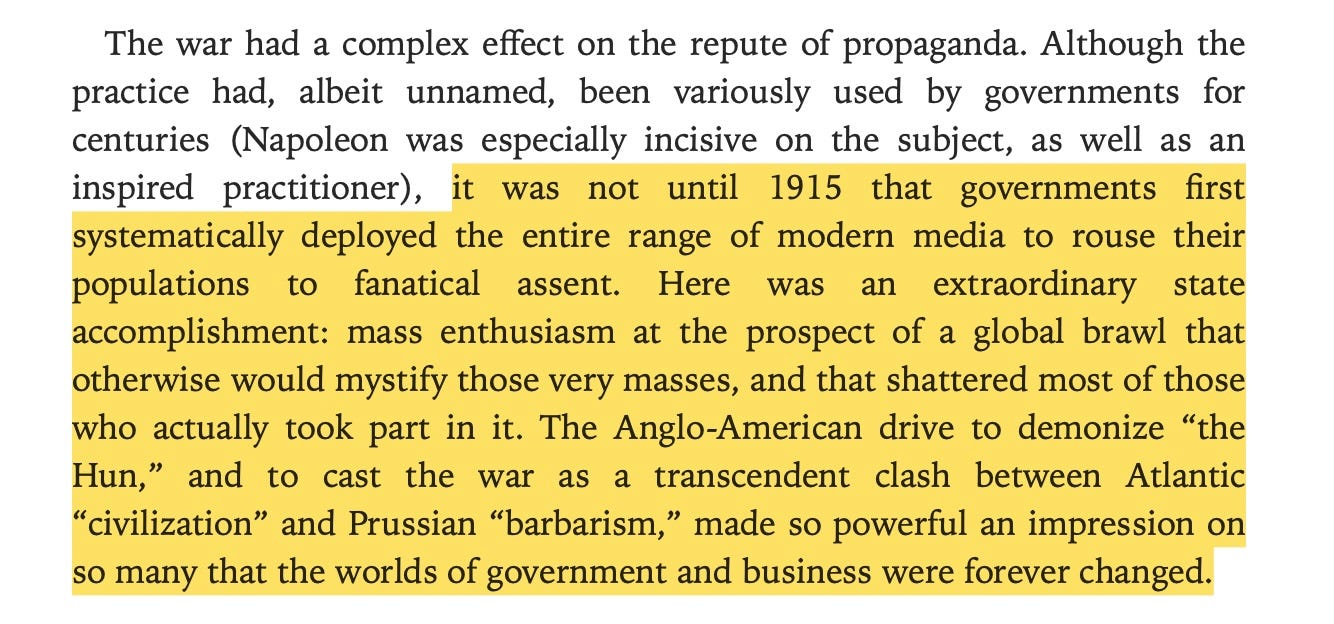
The most prominent example is “this 1918 propaganda poster [by] artist Harry R. Hopps, depicts Germany as an enraged gorilla stepping foot on an American shore as Europe lays in ruin in the distance.”

WWI, far from being ‘Great’, was stupid as shit. Millions of young men gladly went to an absolutely wretched fate, propaganda cheering and deceiving them all the way. This more than anything gave propaganda a bad name, but like any number of industrial sins, it stayed.
It’s not that propaganda is necessarily bad. It’s just that in the hands of powerful elites, it’s usually used that way. To kill, rob, and oppress people. A weapon by another name.
How Is The Economist (Bad) Propaganda?
Now we get to the meat of this article, which you’ve had to wade through a whole ‘nother article of throat clearing to get to. The pictures. These are over a dozen recent Economist covers, placed side-by-side so you can see how internally contradictory they are. This to me is a hallmark of weaponized propaganda, best explained by this Tom Gauld meme:

The only thing I’d add for liberalism is a little dinghy called ‘debate and reform,’ moored helplessly off the coast. It’s called ‘dissent and revolution’ on the other side.
Debate Vs. Dissent
By endlessly debating things, liberal elites claim popular dissent as a part of the system and avoid doing anything. It just becomes a toothless cultural circus. As an example, here’s The Economist talking about the power of protest one month and then rejecting any new thinking about race. They hype up ‘Black Lives Matter’ in June and then roll in with ‘All Lives Matter’ in July. This is how the system devours its rebellions and shits them out.
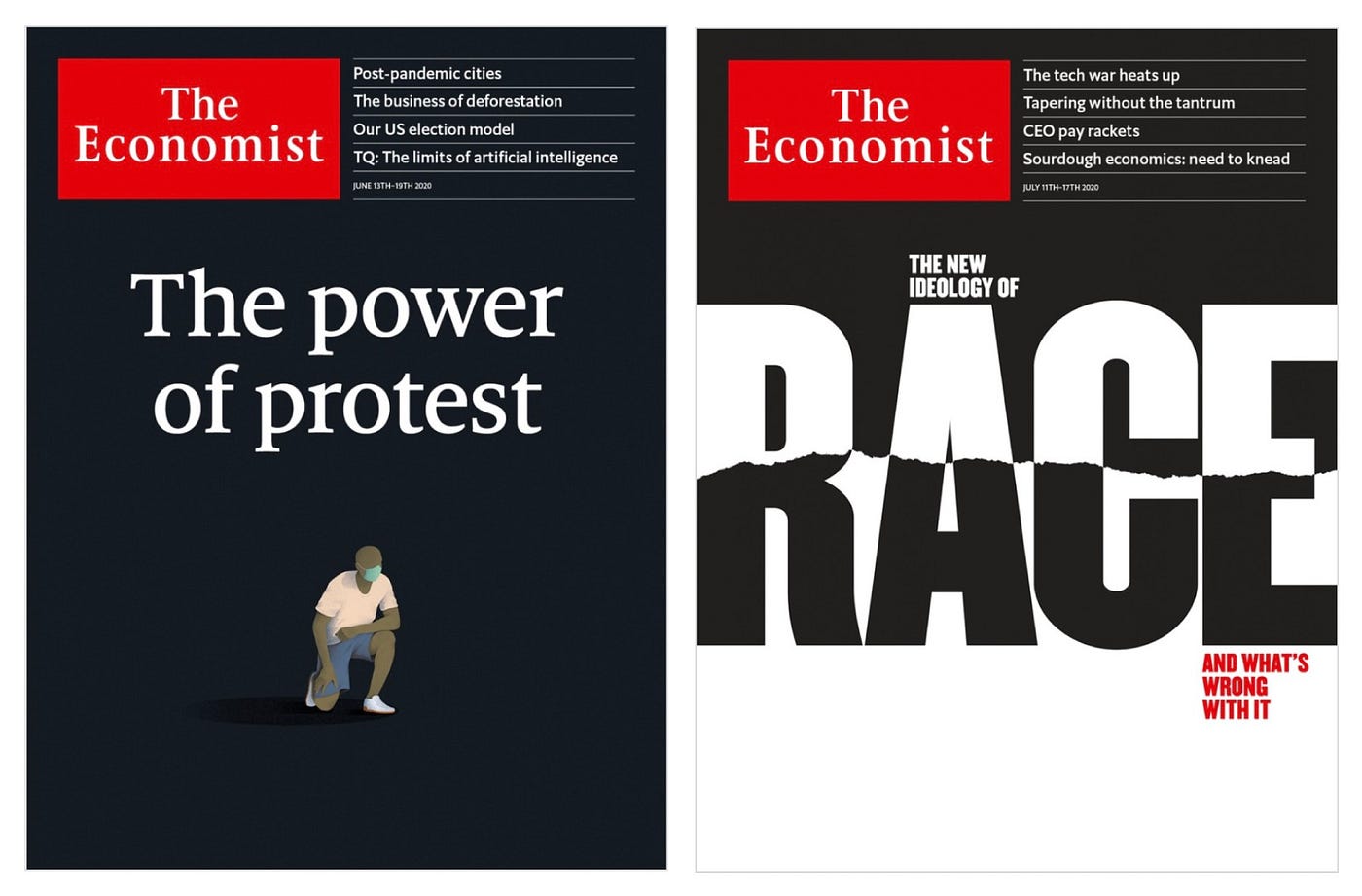
This is how The Economist uses information used as a weapon to subvert actual rebellion at home. It’s also used to try and foment rebellion abroad. See how differently The Economist covers huge protests across America compared to protests in one Chinese city.
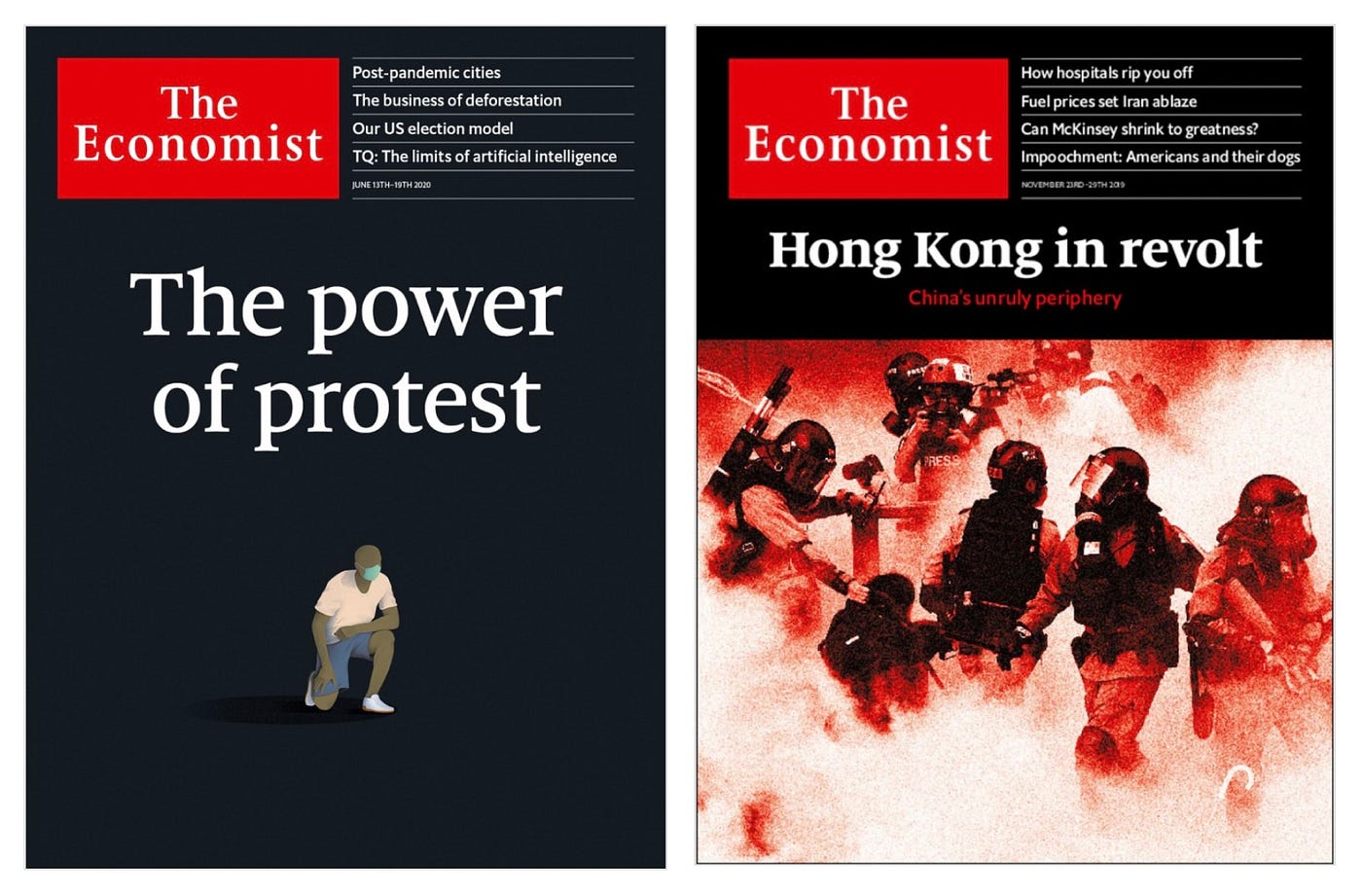
The Economist claims the Black Lives Matter protests as part of their great liberal system, while much smaller protests are a ‘revolt’ against China’s ‘unruly periphery’. This is how the ‘debate and reform’ dinghy becomes a ‘dissent and revolution’ warship on the other side. It’s not even a contradiction. This is war propaganda working as designed.
This is why I call The Economist the most rank propaganda, because it’s wielded by the most rapacious oligarchy in the history of the world to accomplish extremely violent things. The Economist fucking loves war. It puts state propaganda to shame.
War And Peace
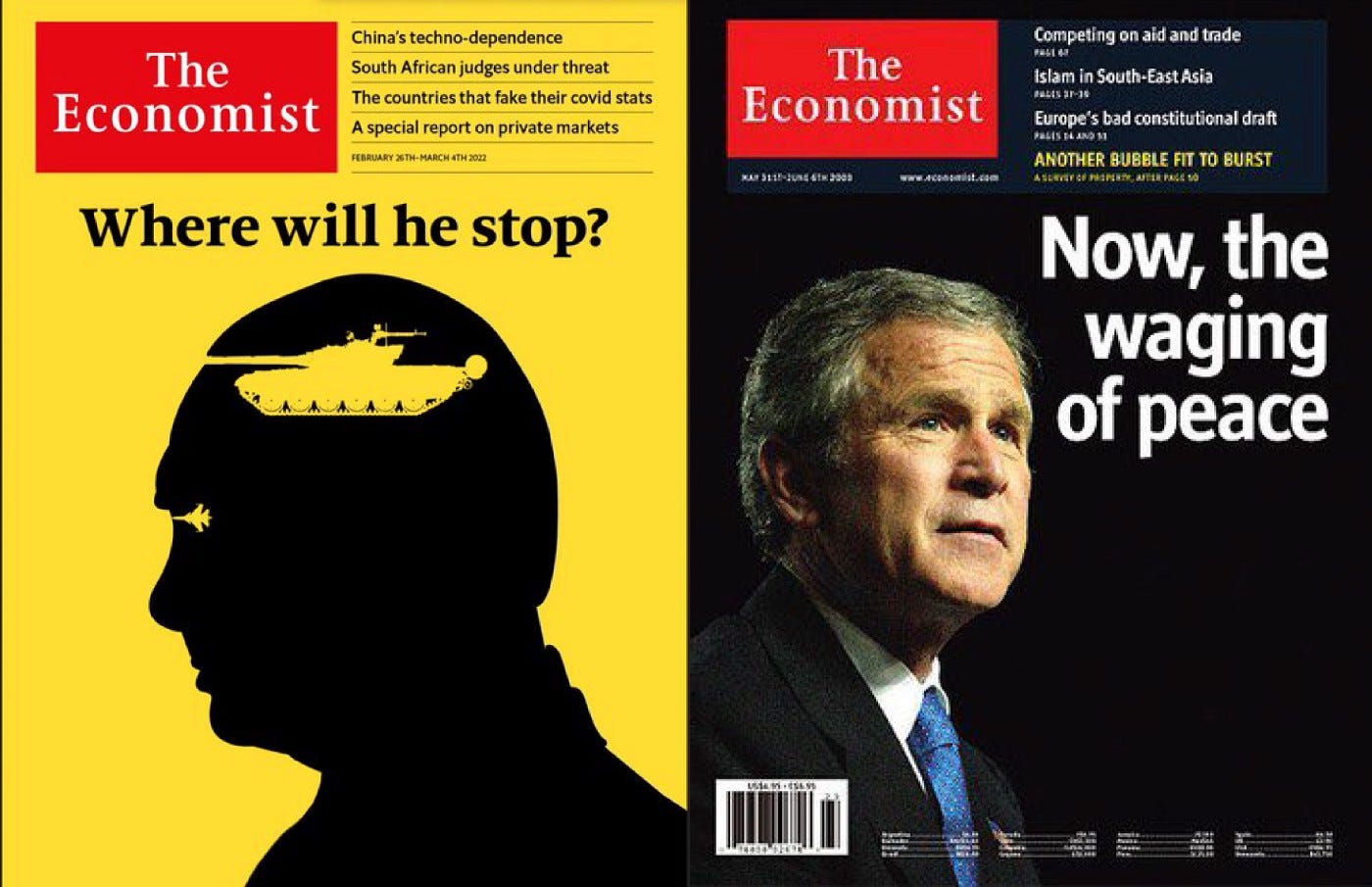
Just look at the different coverage of Putin’s invasion of Ukraine with Bush II’s invasion of Iraq. They ask ‘Where will he stop?’ of Putin but call Bush II’s violence ‘the waging of peace’. If the wages of sin are death, this magazine should be deceased.
As Zevin writes, “In 2012, Johnny Grimond gave a speech at his retirement party announcing that in all his time there, the Economist ‘never saw a war it didn’t like’ — a memorable barb, eliciting nervous laughter from his colleagues and a riposte from Bill Emmott.”
Indeed, the only time The Economist briefly opposed imperialist war was World War I under Editor Francis Hirst, and he was fired. Besides that “the Economist has supplied a consistent, case-by-case justification of liberal imperialism, from the nineteenth century to the present,” as Zevin laboriously documents.
Even seeming ‘good guys’ like Hirst were fundamentally liberal assholes. Following the elitist conception of ‘our progress’ he “railed against the idea that women had a right to vote,” pissing off even his wife. “Around the time he began to compare suffragettes to Russian and Turkish marauders — pillaging ‘solemn vows, ties of love and affection, honour, romance’ — his wife, Helena, took up with the [suffragettes].”
You can see in this statement from 1914 that even the targets of liberal imperialism haven’t changed. They’re still railing against Russian and Turkish marauders, while their killers are just ‘heroic adventurers’.
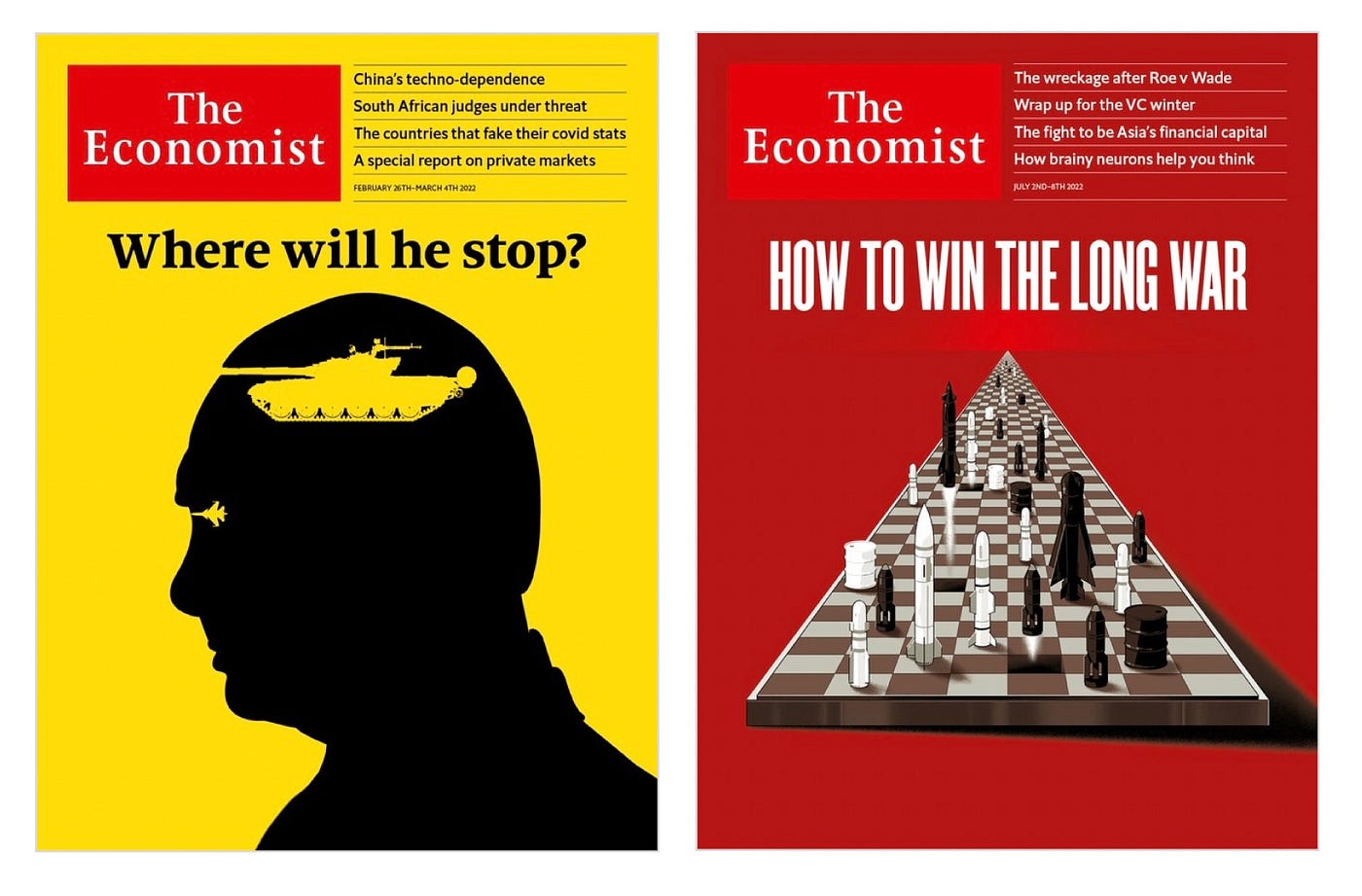
Just see how they plaintively ask where Putin will stop while proudly advertising a ‘long war’ from their own side. After NATO has invaded dozens of countries and rammed itself up Russia’s ass, the question ‘where will we stop?’ is never asked. For The Economist their side is never waging war. It’s ‘waging peace’. If this isn’t the most stanking propaganda I don’t know what is.
For The Economist, one of the most aggressive acts a people can commit is placing their country near an American military base. Iran is somehow on a ‘collision course’ with America despite being a piece of land that’s not moving. What the fuck are they supposed to do? Move their country?
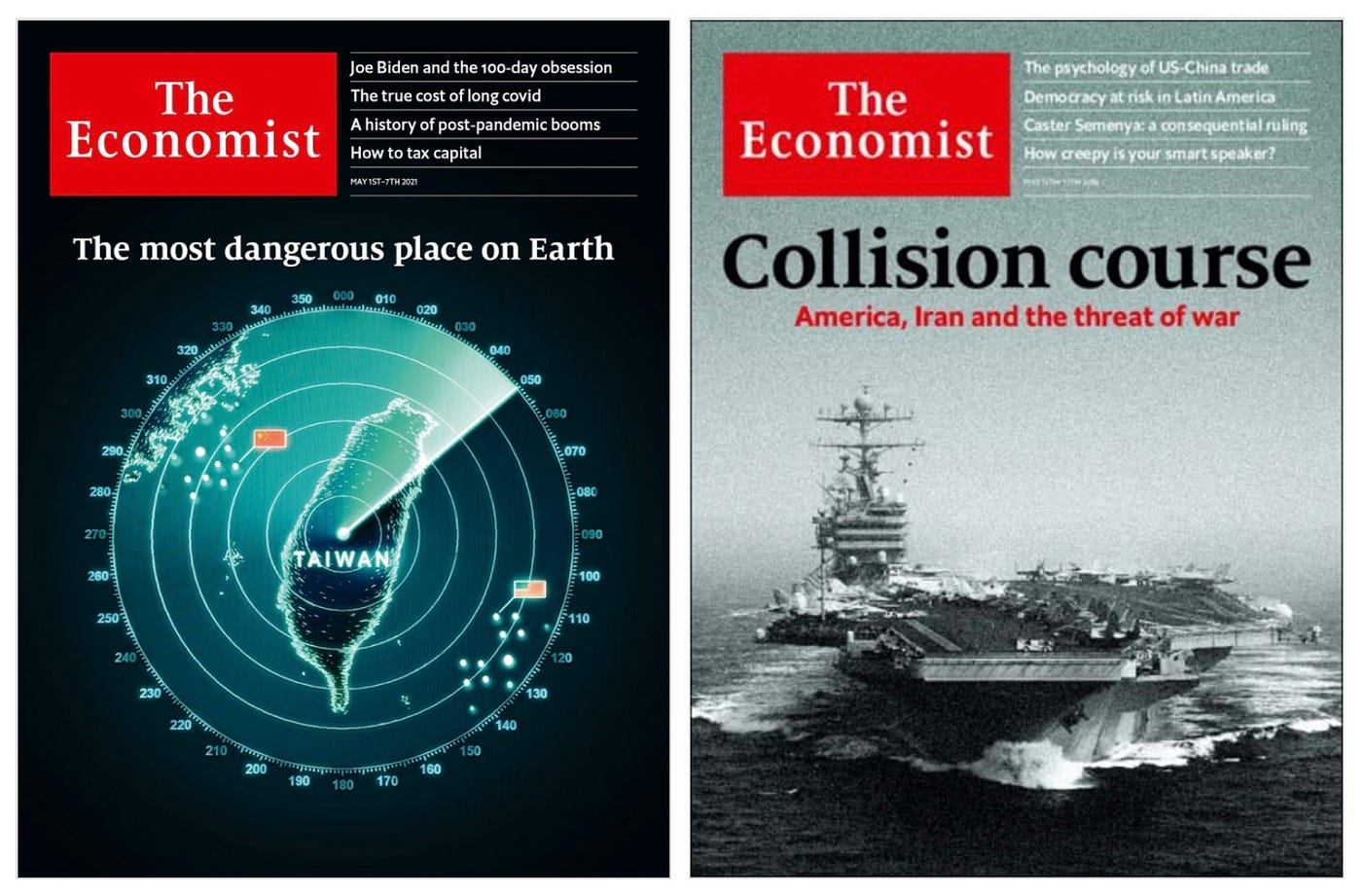
The Economist shamelessly launders the fact that America has every right to sail aircraft carriers and hijack oil in the Persian Gulf, whereas Iran is threatening for even being there.
In the same way, a map of Taiwan is uncritically presented with American ships miles away from China, as if they’d tolerate any of this shit along their own coastline. They call Taiwan ‘the most dangerous place on Earth’ and miss the point that globally, they are the danger. As the more honest Walter White said in Breaking Bad, “A guy opens his door and gets shot and you think that of me? No. I am the one who knocks!”
Power And Weakness
Another contradiction inherent in violent propaganda is that the enemy must be both about to take over the world and about to collapse. They must be both absolutely fearsome and absolutely contemptible. They must be brutally aggressive and complete cowards. This is not a contradiction really. It’s not about facts, it’s about feelings. The enemy, whoever it is, must simply be hated.
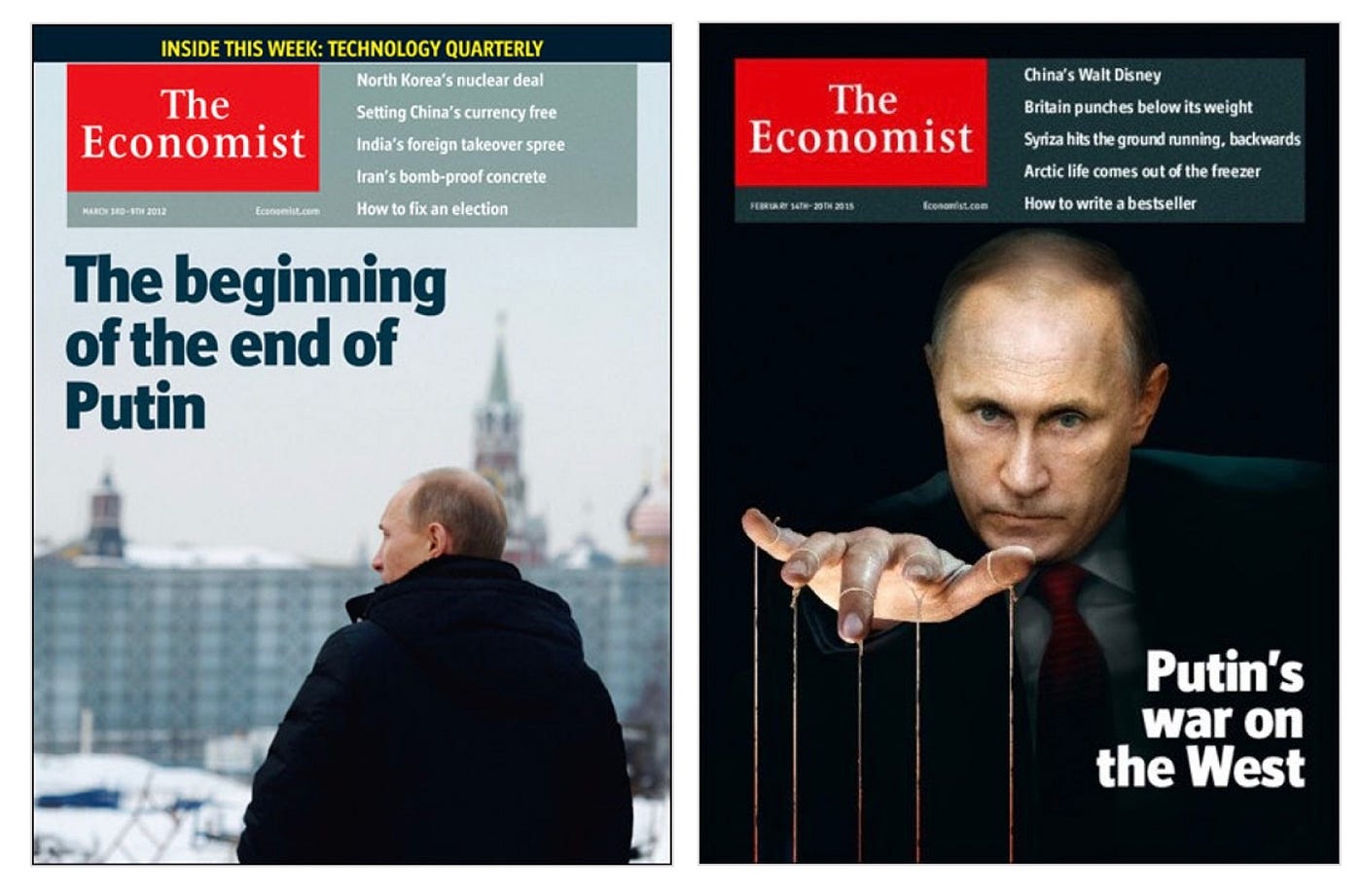
Putin is the most common subject of the five-minute-hate. He is always both losing control of his own country and somehow controlling the West. Has been for decades. None of this makes sense viewed next to each other, but get the magazines a few issues apart and you get the emotional message clear enough. Putin bad. Putin hate.
This eternal Putin is reminiscent of the eternal Goldstein in 1984. As that text said:
It will be a world of terror as much as a world of triumph. The more the Party is powerful, the less it will be tolerant: the weaker the opposition, the tighter the despotism. Goldstein and his heresies will live forever. Every day, at every moment, they will be defeated, discredited, ridiculed, spat upon and yet they will always survive. This drama that I have played out with you during seven years will be played out over and over again generation after generation, always in subtler forms.
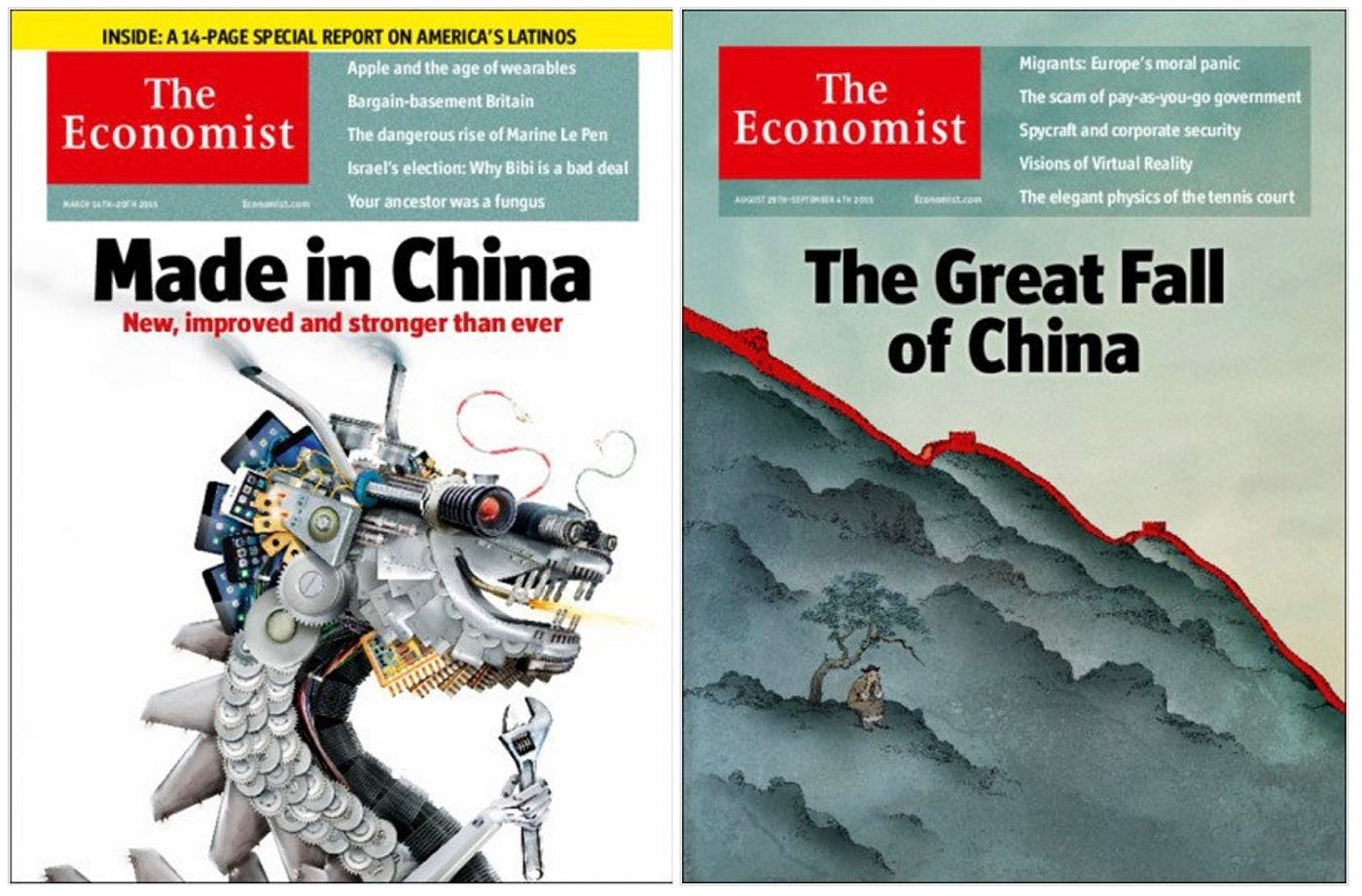
The Economist is also equally bipolar about China. China is ‘new, improved and stronger than ever’ in March of 2015 and then about to fall in August. Orwell was wrong about having to go back and erase the past. You can just bury people in new issues. Just flood the zone with shit.
In The Economist, China is Schrödinger’s economy. Simultaneously dead and alive, depending on when they observe it.
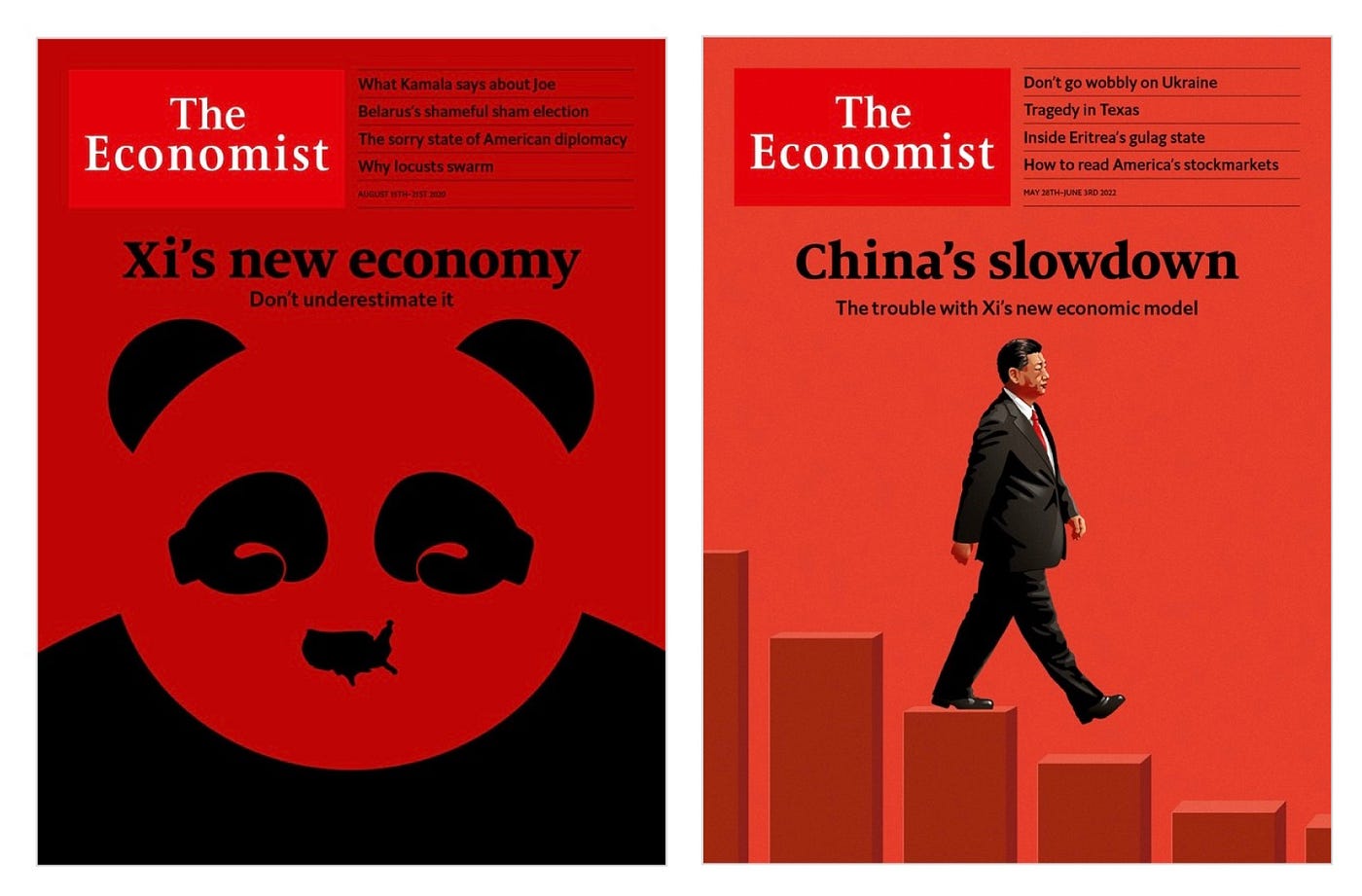
As an Economist reader you’re supposed to not underestimate China’s economy, and then not overestimate it. China is both an existential threat and an idiotic failure depending on when they hit publish. This goes back and forth from cover to cover. The only constant is that whatever China is doing, they’re doing it wrong.
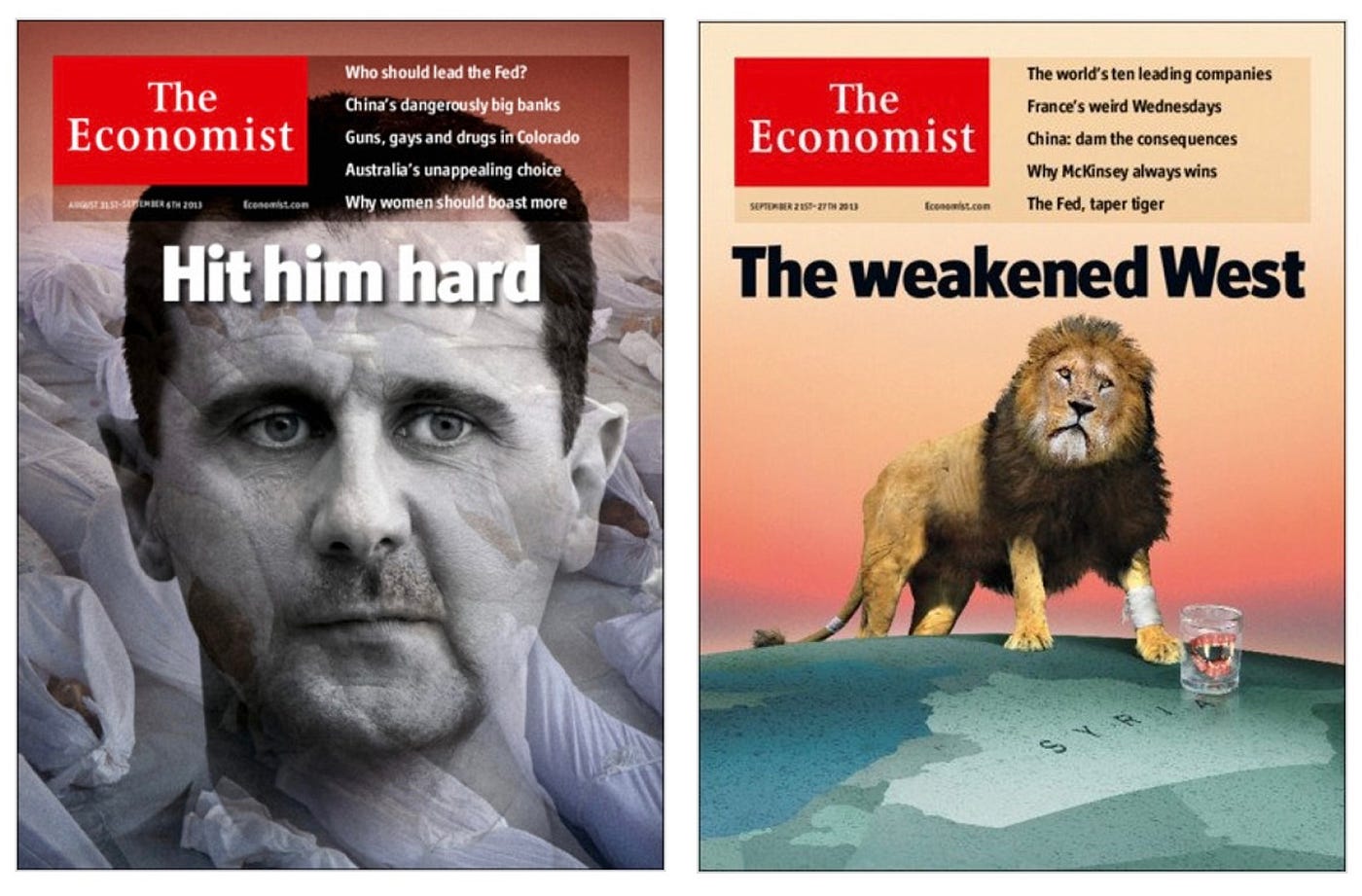
The contradiction between power and weakness applies to Empire itself. One month they’re saying ‘hit him hard’, meaning bomb Syria more, and implying that it’s easy. The next month ‘the weakened West’ has somehow lost its dentures. Empire must both be threatening and under threat. Violence must be easy, but other countries must also be dangerous enough to justify it. It’s a delicate balance, which The Economist simply avoids by whipsawing from contradiction to contradiction each issue.
Us Vs. Them
The central tenet of propaganda is that whatever we do is good and whatever they do is bad. This justifies every brutality, because the enemy is always worse. This is the sort of hypocrisy The Economist is notorious for.
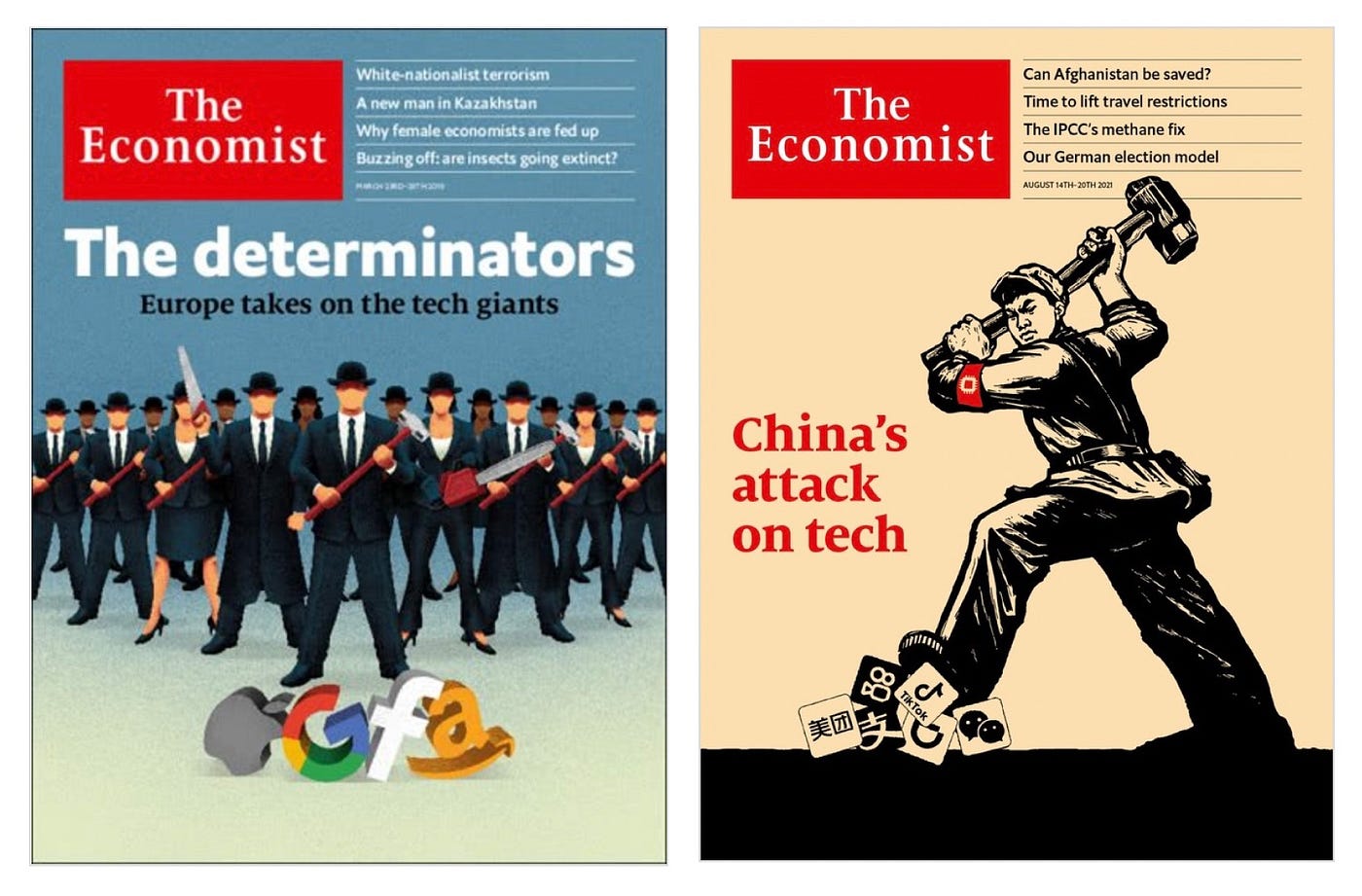
Europeans taking on tech giants, for example, are ‘the determinators,’ ‘taking on’ the tech giants boldly and bravely. China doing the same thing more effectively, however, is an ‘attack on tech’. As the comic goes, “our blessed homeland, their barbarous wastes”. This thinking is endemic to The Economist.
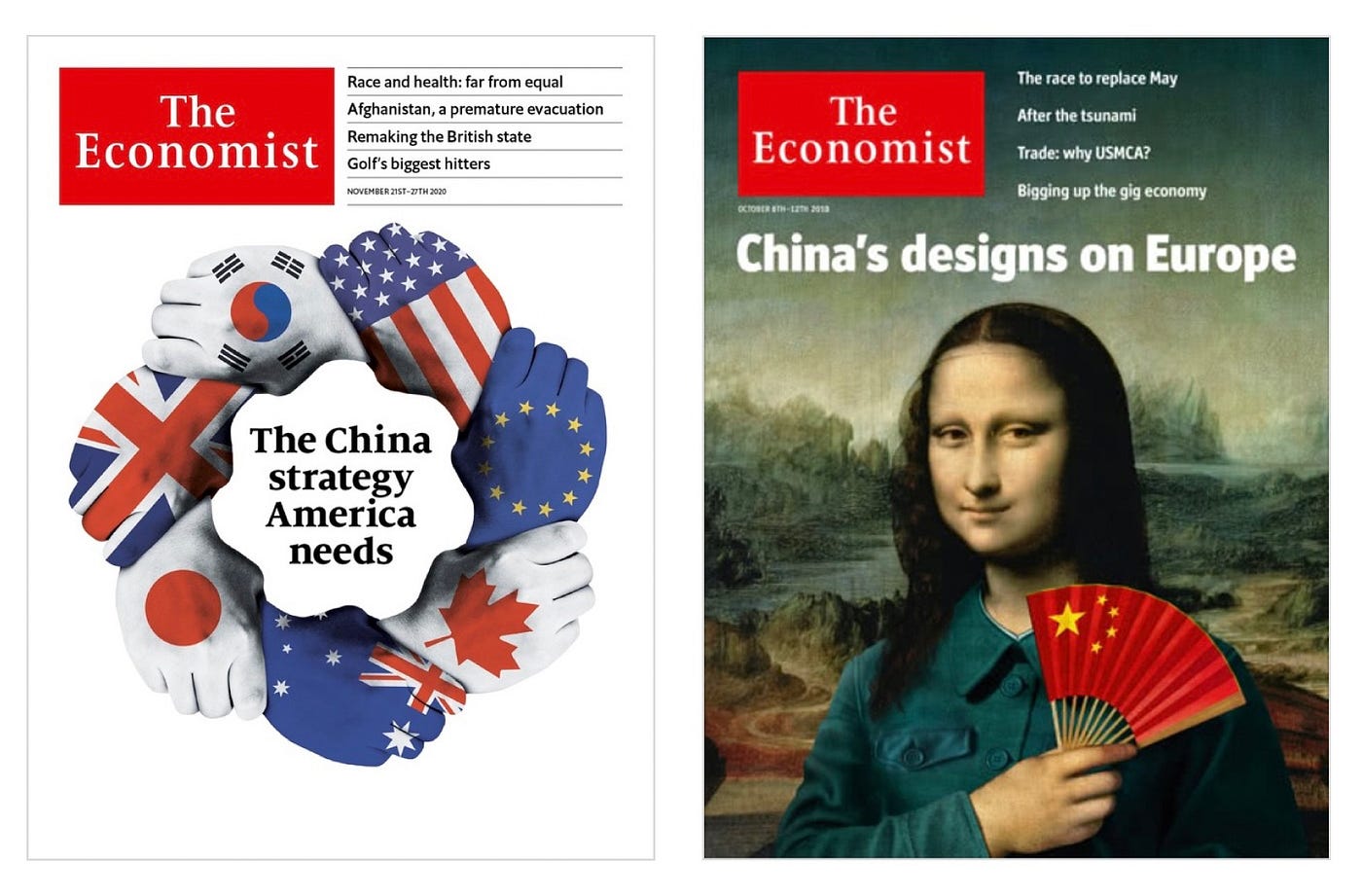
Here White Empire needs to have a China strategy, while China has ‘designs’ on Europe. Only Empire is allowed to have strategies, everyone else must be subject to them. And unlike imperial military and economic sieges, China’s main strategy is trading with Europe, something that should hardly be offensive to free-trading The Economist. It just shows you that free trade was always bullshit. They just mean free reign for imperialism and the oligarchy that runs the show.
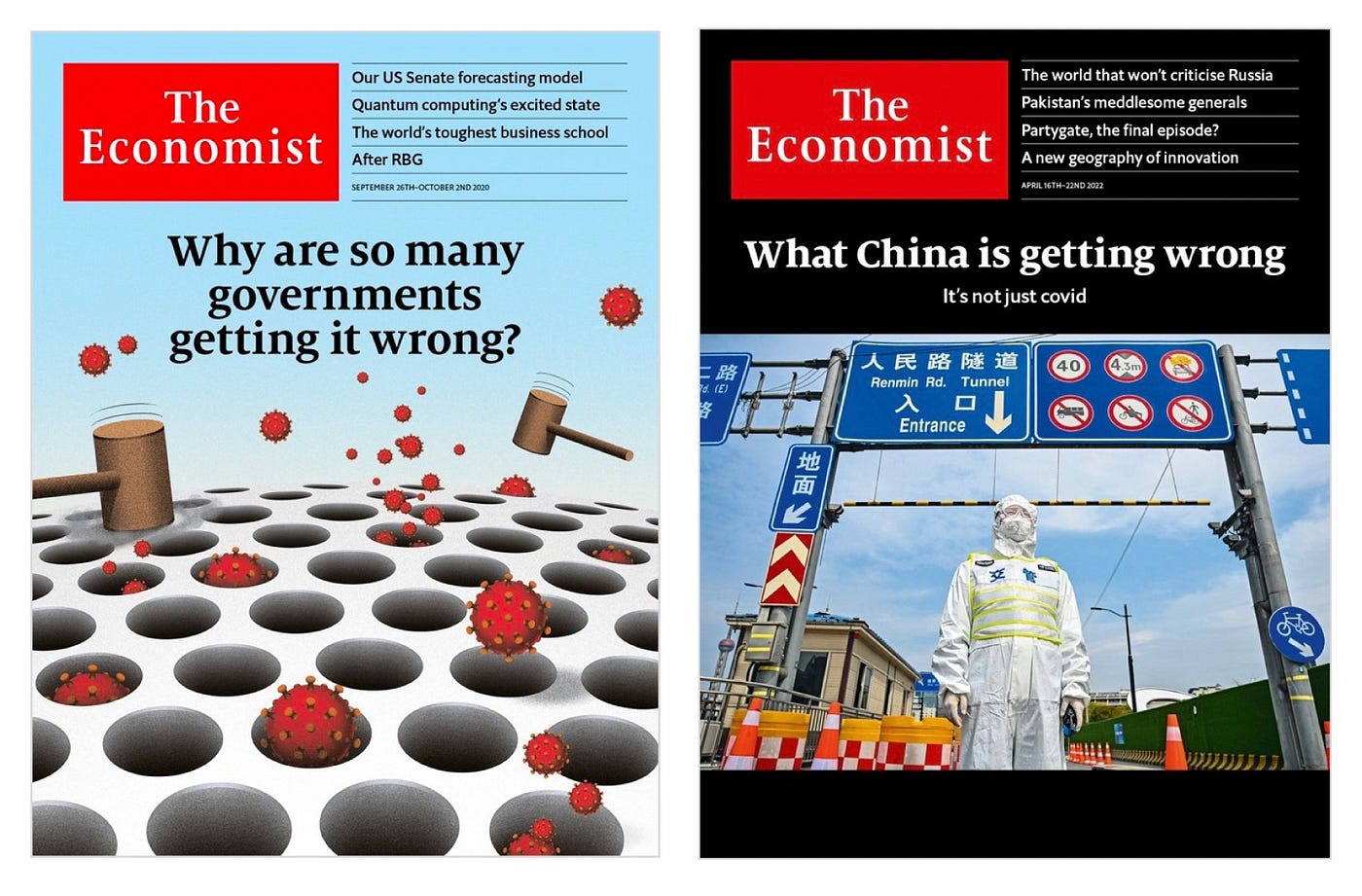
The Economist has a real problem with China which ties them into all sorts of logical knots. The magazine asks ‘why are so many governments getting it wrong?’ in fighting COVID but ignores the amazing success of China. The propaganda line is that China is getting everything wrong, and The Economist has that has to include COVID, actual body counts be damned. Besides being wrong, this prevents Economist readers from actually learning anything from China. This is just another way propaganda be killing.
The whole Cold War II against China parallels what Bernays said about WWI, “Here was an extraordinary state accomplishment: mass enthusiasm at the prospect of a global brawl that otherwise would mystify those very masses, and that shattered most of those who actually took part in it.” The only difference is that the propaganda arm has been privatized, spreading not just through establishment papers like The Economist but also random YouTubers and people commenting online.
The propaganda works. The world has been purposefully divided into us and them by ruling elites, and people within the Empire quite dutifully get in line.
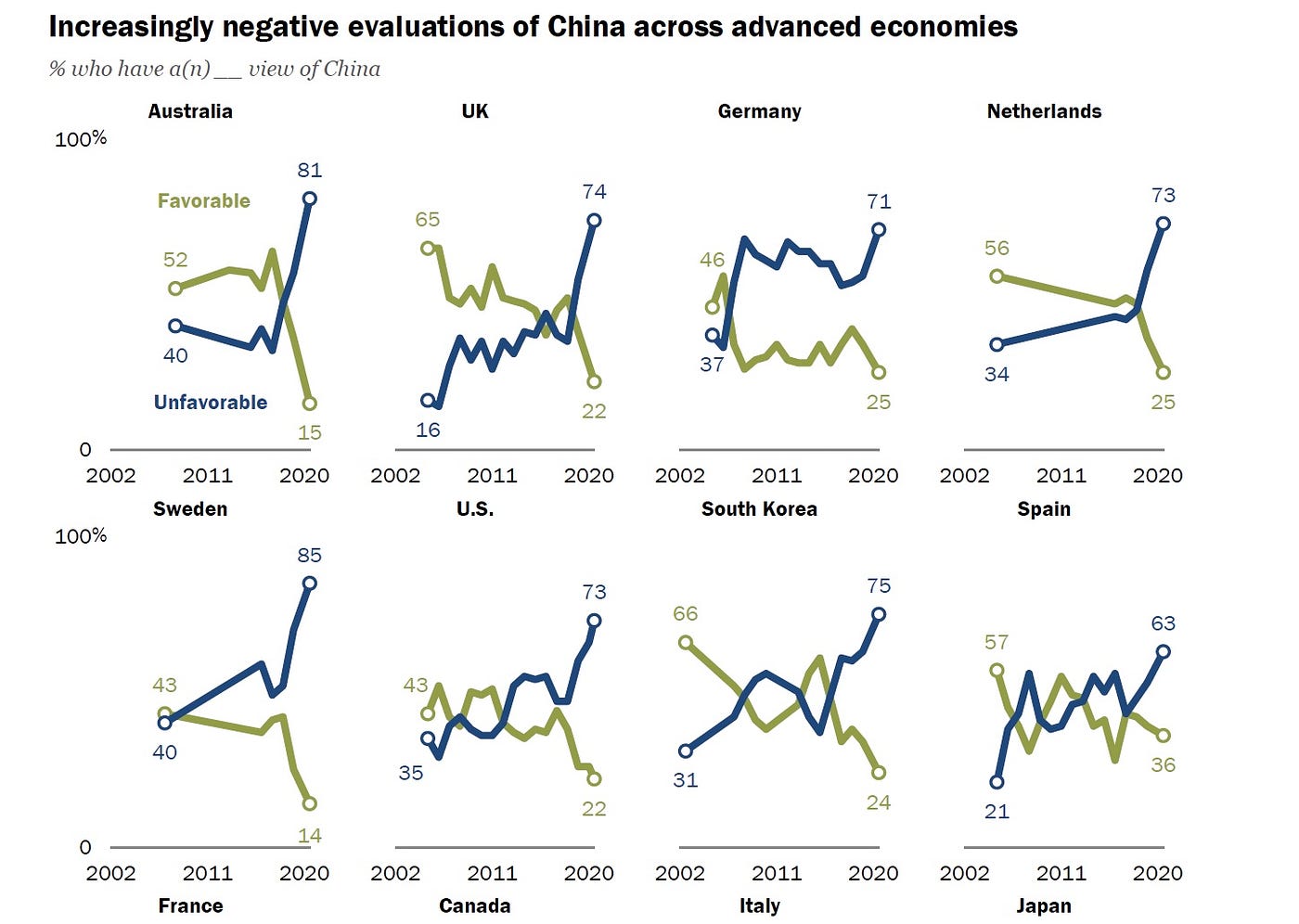
These increasingly negative opinions have been manufactured with industrial levels of propaganda. People didn’t all start thinking about China at the same. For an example of how this works, look at anti-immigration sentiment in the UK. It tracks tabloid coverage more closely than actual immigration, then the sentiment somehow disappeared when the tabloids stopped ‘advertising’ after Brexit.
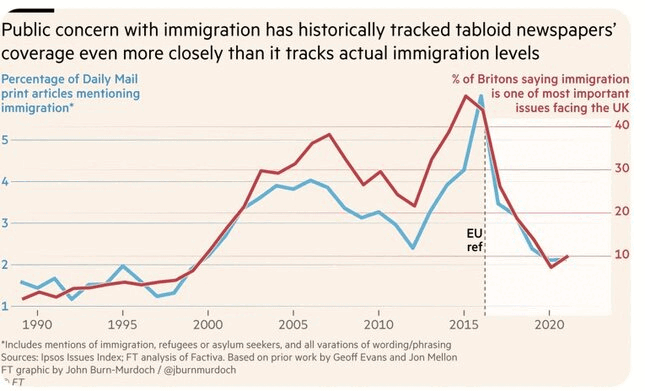
That is the danger of all this propaganda. That it works. The Economist was on the other side of Brexit and immigration (generally), but they still have a pernicious effect on elites who are dragging the world towards World War III just as they dragged Europe towards WWI last century.
Contradictions and Propaganda
As you can see, seeming contradiction is central to propaganda. Factually this is true—China is not both simultaneously outpacing White Empire and falling behind, Putin is not simultaneously losing control and controlling everything—but forget facts. Focus on character. Propaganda is all about characters, good and evil. And in this way, there’s no contradiction in screeds like The Economist.
China is always bad, it’s either growing so much that it’s somehow dangerous, or so little that they’re a threat to its own people. Russia is always evil, it’s either so powerful that it’s dangerous, or so weak that it’s about to collapse on its own people. There’s no contradiction in the story here, even if the facts cannot logically fit at all. Hannah Arendt called this a ‘lying world of consistency.’
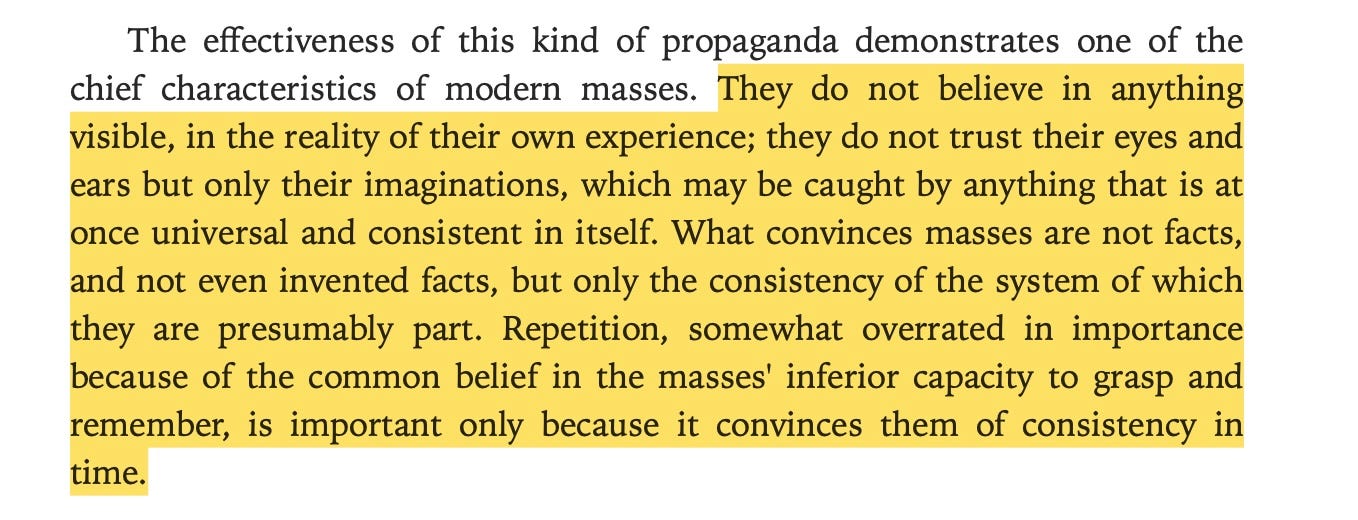
She said, “what convinces the masses are not facts, and not even invented facts, but only the consistency of the system of which they are presumably part.” And yet even in an elitist magazine like The Economist, this phenomenon is no less real. Even highly-educated people can whipsaw from contradiction to contradiction, which just goes to show that formal education is largely a class marker, not any particular protection against ignorance. We all have eyes and ears, and education is often just a fancy way of ignoring them.
Orwell talked about some dystopian socialist party getting people to “reject the evidence of your eyes and ears. It was their final, most essential command.” He missed how the same situation could play out under capitalism. Instead of armies of bureaucrats laboriously snipping the past out of existence, we have private presses flooding people with so much news that they can’t process anything. Instead of silencing every opinion, the White Empire has so much opinion that nothing gets done. Cultural battles are waged daily in the Cable-TV Colosseum, while Senators and oligarchs make the real decisions behind closed doors.
This is the liberal system that The Economist propagandizes for, meaning promotes, with a bias towards violence. This is what I mean when I say The Economist is the most rank sort of propaganda. It stinks and it’s dangerous. What they peddle is not an intelligent view of the world, it’s a transparently elitist and willfully ignorant one. The Economist has incited so much violence that it should be pulled up for genocide. Instead, they lecture everyone about human rights. It’s a farce.
In truth, the magazine—with its omniscient, god-like voice—is about one thing and one thing only. What Orwell called the ‘intoxication of power, constantly increasing and constantly growing subtler.’ White Empire has merely privatized this power, including the power of propaganda. That’s all The Economist is. It’s just the worst sort of propaganda.